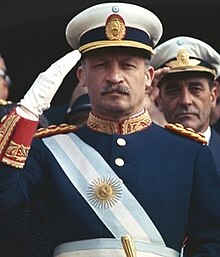Juan Carlos Onganía
| Juan Carlos Onganía | |
|---|---|
 |
|
|
35th President of Argentina De facto |
|
|
In office June 29, 1966 – June 8, 1970 |
|
| Preceded by | Arturo Umberto Illia |
| Succeeded by | Roberto M. Levingston |
| Personal details | |
| Born |
March 17, 1914 Marcos Paz, Buenos Aires |
| Died | June 8, 1995 (aged 81) Buenos Aires |
| Nationality | Argentine |
| Political party | none |
| Spouse(s) | María Emilia Green |
| Profession | Military |
| Religion | Roman Catholicism |
| Military service | |
| Allegiance | Argentina |
| Service/branch | Argentine Army |
| Years of service | 1934–1970 |
| Rank | Lieutenant General |
Juan Carlos Onganía Carballo (Spanish pronunciation: [ˈxwaŋ ˈkarlos oŋɡaˈni.a]; March 17, 1914 – June 8, 1995) was de facto President of Argentina from 29 June 1966 to 8 June 1970. He rose to power as military dictator after toppling the president Arturo Illia in a coup d'état self-named Revolución Argentina (Argentine Revolution). (Although Peronism - the chief political force in Argentina at the time - was proscribed, Illia's UCR was generally seen as legitimately elected.)
While preceding military coups in Argentina were aimed at establishing temporary, transitional juntas, the Revolución Argentina headed by Onganía aimed at establishing a new political and social order, opposed both to liberal democracy and to communism, which gave to the Armed Forces of Argentina a leading role in the political and economic operation of the country. The political scientist Guillermo O'Donnell named this type of regime "authoritarian-bureaucratic state", in reference both to the Revolución Argentina, the Brazilian military regime (1964–1985), Augusto Pinochet's regime (starting in 1973) and Juan María Bordaberry's regime in Uruguay.
...
Wikipedia
